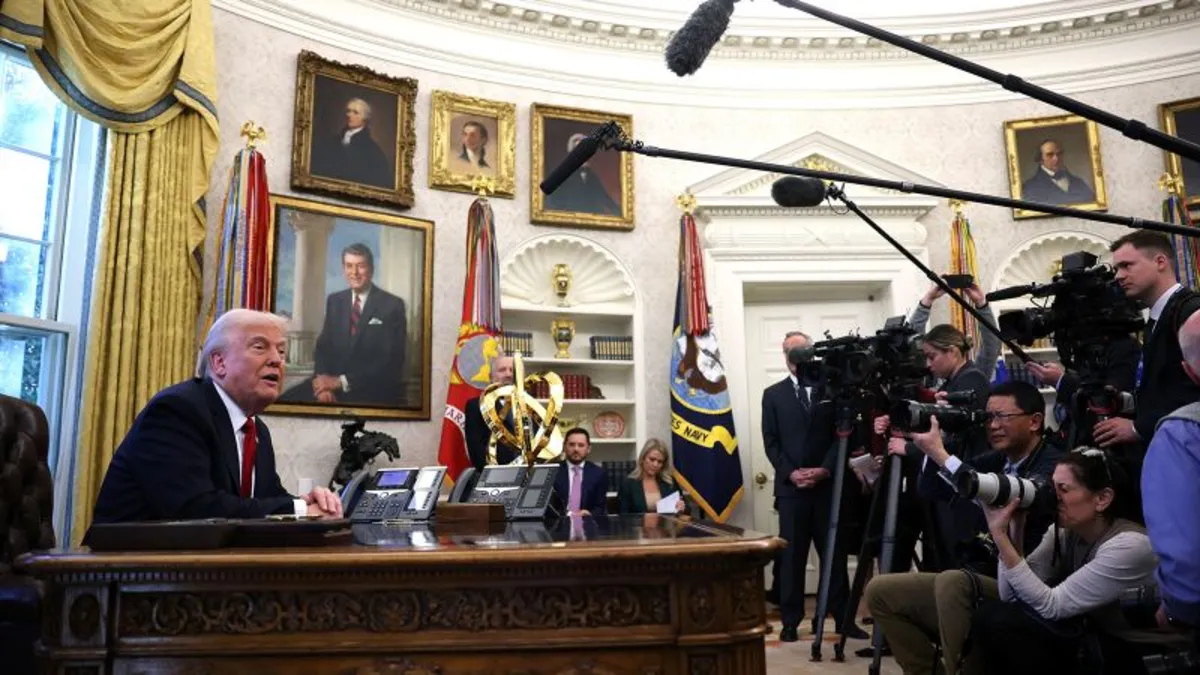
In the tumultuous environment of Donald Trump’s White House, the focus often shifts from the mistakes made to the vigor with which one defends their actions. A recent incident involving the operational details of military strikes on Yemen, which were inadvertently shared in a group chat among top administration officials, underscores this unsettling dynamic. This breach of security not only raises questions about the competence of the officials responsible for safeguarding U.S. national security but also points to a troubling pattern of negligence among Trump aides that could have endangered American pilots.
The sharing of sensitive military information represents one of the worst intelligence breaches seen in recent years. Despite the gravity of the situation, the administration's primary concern appears to be protecting the president and his inner circle. Rather than addressing the malfeasance, officials are resorting to a narrative that positions Trump as a victim of a supposed deep state conspiracy. This tendency to politicize national security scandals reflects a broader characteristic of a White House reluctant to acknowledge its own faults—a principle that appears to be deeply rooted in Trump’s pre-political ethos.
The fallout from this incident could have significant repercussions for U.S. operations in Yemen and might tarnish America’s reputation on the global stage. Moreover, it provides an intelligence advantage to adversaries, who may now have increased insight into U.S. military strategies. The blatant disregard for basic security protocols exhibited by top officials raises concerns about the integrity and accountability of government operations.
While it remains uncertain if any top Cabinet members will face consequences, the history of Trump's dissatisfaction with subordinates suggests a slow unraveling may occur, influenced by media scrutiny. White House press secretary Karoline Leavitt dismissed the situation as a mere “hoax,” claiming that Democrats and mainstream media are adept at orchestrating misinformation campaigns. She notably criticized Jeffrey Goldberg, editor-in-chief of the Atlantic, for being mistakenly included in the chat, which could further complicate the narrative surrounding the incident.
Trump himself downplayed the severity of the leaked information, suggesting that national security adviser Mike Waltz was primarily responsible for the incident. This dismissive approach highlights the administration's willingness to deflect responsibility rather than confront the reality of their operational failures.
The implications of the leaked group chat are alarming. Details about timing, targets, and weaponry were shared in a manner that could have jeopardized American service members during operations in Yemen. Despite claims to the contrary, the posted information indicated a significant breach of standard military practice, which dictates that intelligence should remain tightly controlled until all personnel are out of harm’s way.
Senator Mark Warner expressed his concerns over the potential risks posed to U.S. personnel, emphasizing the arrogance and incompetence that such breaches reflect. In a landscape where operational security is paramount, the dissemination of sensitive information could easily alert enemy forces and compromise the success of future missions.
The fallout from this security breach extends beyond immediate operational risks. The indiscreet comments made by Defense Secretary Hegseth about U.S. military successes could provide valuable intelligence to the Houthis, leading to heightened security measures on their part. The knowledge that the U.S. possesses significant intelligence capabilities in Yemen could embolden adversaries to adapt and counteract American strategies.
The selective accountability demonstrated by the Trump administration raises further concerns. While senior officials evade scrutiny, lower-ranking military personnel would likely face serious repercussions for similar breaches. The inconsistency in accountability highlights a troubling double standard within the administration.
As the Trump administration navigates this security breach, the implications for national security and military operations remain precarious. With Trump supporting his officials—at least for now—the potential for enduring consequences looms large. The historical patterns of turnover among national security advisers suggest that loyalty may prevail over competence, leaving crucial national security decisions in the hands of those who may not be best equipped to handle them. As this situation unfolds, the need for transparency and accountability in matters of national security has never been more critical.